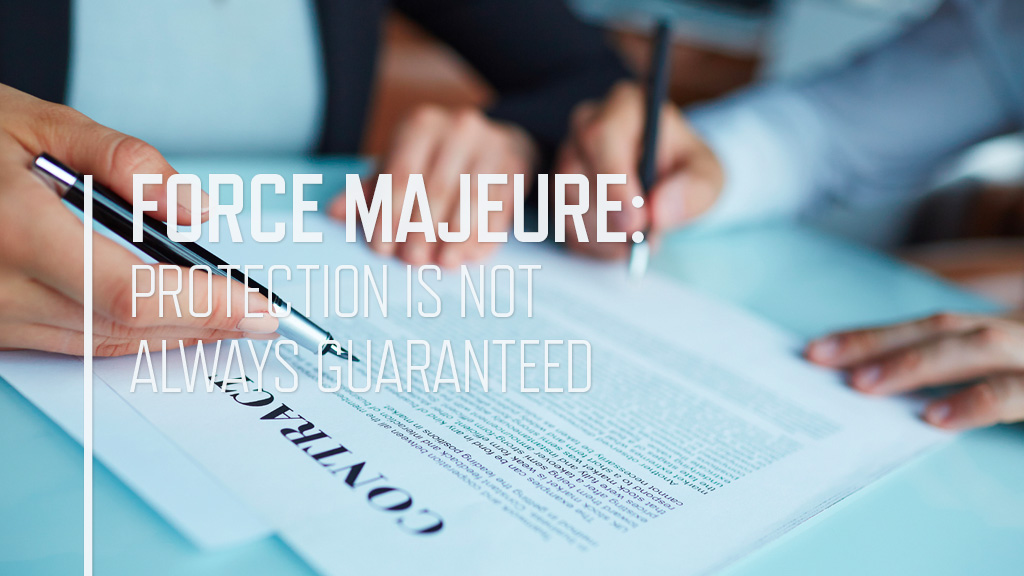Force majeure is the legal clause that is brought up the most by event planners when discussing contracts. On almost every event/artist contract, there is a form of force majeure built into the contract but what does it actually mean and how does it protect you against COVID19 cancellations?
Any event planned to occur in the next six to eighteen months (at the time of writing this) is at risk of cancellation.
For some time, event managers have been purchasing insurance plans to minimize their risk in the event that something like this happens, but insurance companies are not built to pay out. Since the SARS outbreak of 2002/2003, insurance companies have been carefully writing epidemics out of their coverage, even as it applies to the force majeure clause so assuming that this “term” is covering you. Well...it’s not a guarantee.
As many governments are giving no insight into the return of events, it’s important for all event professionals to take a close look at what force majeure can — and can’t — actually do for them.
What Is “Force Majeure”?
“Force majeure” is French for “superior force,” and nowadays the term force majeure isn’t specific to one legal system and it generally “means what the contract says it means.” That is, it’s up to the signatories of the contract to define the specific conditions for a force majeure claim.
Even though the term is open to interpretation, the same basic principle applies wherever it is used: it refers to unforeseeable circumstances beyond the control of the parties that prevent fulfilment of their contractual obligations. In fact, it is usually used only for situations that make it impossible to fulfill a contract.
How Can Force Majeure Protect You?
In force majeure situations, both parties of a contract usually agree to bear their own losses. Needless to say, the COVID19 crisis is not good for either party, and thorough contracts can help ensure a smooth resolution. A force majeure clause can lay the groundwork for a mutually-agreeable plan designed to mitigate a difficult situation. When going through your artist, insurance or business contacts it is important to review force majeure as almost its own separate contract. It can be edited just like anything else in the contract as long as it is mutually agreeable.
A greater level of scrutiny is especially critical for new contracts being drafted in this time of high-alert because the clause is designed to protect against unforeseeable events.
At this point, event cancellations resulting from social distancing and containment policies is an actual likelihood, rather than just a risk. This obviously depends on how far into the future you plan for the event, but the reality is that there is no way to know when it will be safe to host events again, and the most modest projections are based on when a vaccine might become available in a year’s time. So when reviewing your force majeure clause, including cancellation due to the effects of COVID19 should be added or clarified in future contracts.
Relationships and Force Majeure
Sometimes, no matter what is written in the contract, having strong industry relationships with suppliers, agents, managers, governing bodies and everyone involved in putting on an event can also ease the pain when there is an impending force majeure situation on the horizon. If there is an opportunity and if appropriate, it can change an outright cancellation where everyone loses into a postponement or rescheduling where parties can fulfil their contracted obligations to one another. The resources, relationships and expertise that a professional event consultant can bring to the table is invaluable in these types of situations.
Trixstar has spent years developing these relationships and skills, they have been put to the test during COVID-19 and many times before that for our clients and our own events. Feel free to reach out to Tayler based out of our Edmonton office (This email address is being protected from spambots. You need JavaScript enabled to view it.) or Brennan based out of our Nashville office (This email address is being protected from spambots. You need JavaScript enabled to view it.) if you need some help with anything covered here or check out our other blog post below!
6 Expert Tips to Consider when Cancelling, Rescheduling or Postponing Events


